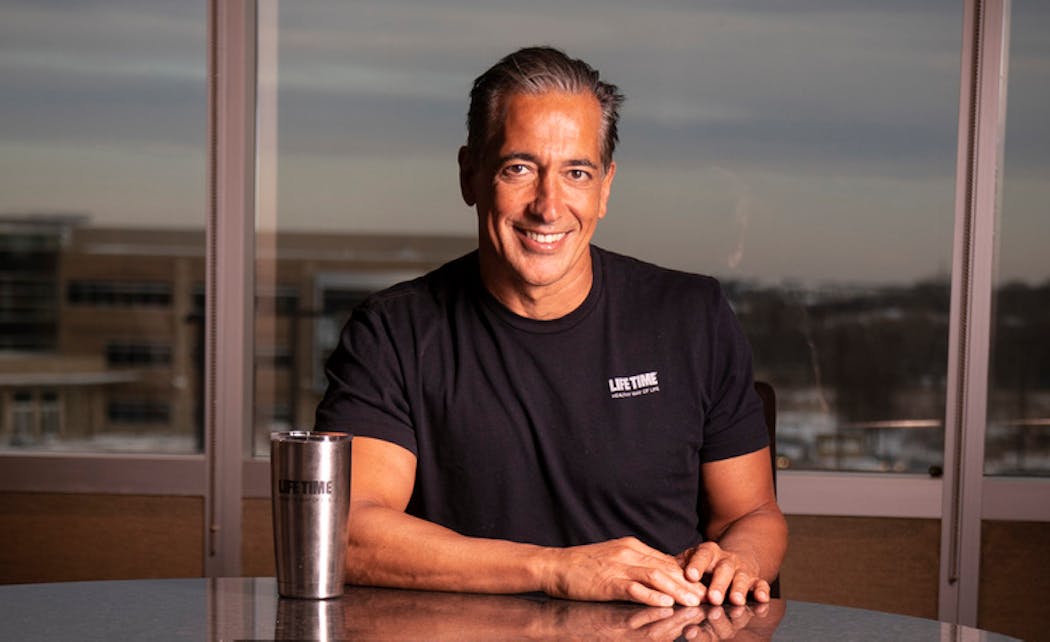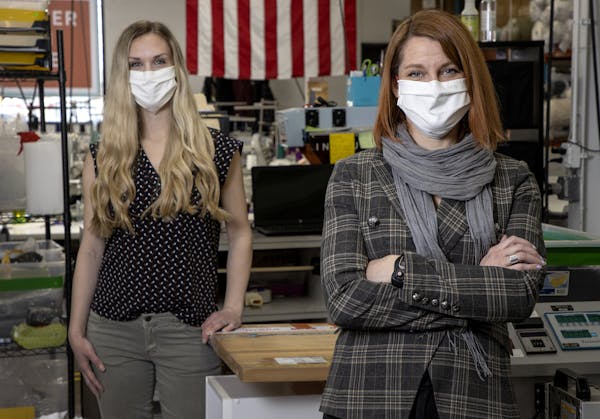As doctors and nurses wage the primary battle against the coronavirus, a secondary conflict is gaining intensity: how to ease the price paid by closed businesses, schools and idled workers. Since mid-March, more Americans lost their jobs more quickly than any time in history. Minnesota just six weeks ago was one of the strongest economies in the country, but now nearly one in five people in the state's labor force is jobless.
Pressure grew all last week for government leaders to chart an end to their stay-home orders and nonessential business designations — and to allow businesses and consumers to adapt to the new reality.
In New Ulm, a co-owner of the Penazz Aveda hair salon, Melissa Lawson, said her stylists and customers are ready to go as soon as Gov. Tim Walz allows. "We're going to open right away. That Monday if possible," she said, assuming he will designate a Monday start. "It will be busy."
But business will be different, Lawson added. Stylists will wear face masks and gloves and sanitize more often. Customers will not be allowed to bring a friend or a child. "We'll probably eliminate our front seating area," Lawson said.
Many Minnesota businesses have already made sweeping changes. Others are being told they can't open. For some, Walz's next decision could make or break them.
The Star Tribune last week interviewed decisionmakers in businesses around the state about when and how to start the next chapter of the crisis. Here's what they said:
Patina Stores Inc.
Christine Ward, owner of Patina Stores, a gift and furnishings retailer that has been around the Twin Cities for 25 years, said Walz holds the fate of the company in his hands.
Ward last week received a Small Business Administration loan to cover payroll costs and must start using the funds this week. But the state won't let work happen in Patina's eight stores.
She wants Walz to give retailers like Patina the same opportunity to do business that he has to liquor stores, coffee shops and garden centers. She said smaller stores can more easily adapt to the new normal than the stores that are currently drawing crowds.
"The safety and health of our employees and customers is the most critical issue for us," Ward said. "We can match what other businesses that were allowed to remain open are doing. As entrepreneurs, we feel we excel in adapting."
She's installing plexiglass at checkouts and already stocked masks, gloves and cleaning equipment at the company's eight stores. She has been able to defer some bills but Patina needs to open next month, Ward said, or it will have to close for good.
"There's no thinking past the end of May for us. There is too much mounting debt," she said.
Shoppers will make more cautious choices because of the virus, Ward said. "People are not going to go into a store that feels unsafe," she said.
Life Time Inc.
Bahram Akradi has been thinking big thoughts about what it will take to get the economy on its feet. The founder and chief executive of Life Time Inc. created a website (bahramakradi.com) to lay out the particulars and last week became one of about 200 corporate heads on President Donald Trump's "economic revival" group.
Life Time has furloughed nearly 37,000 workers — about 90% of its workforce — and put on hold nearly $1 billion in new development. The Chanhassen-based company is maintaining health coverage of its workers and set aside $10 million for employees who need more help than unemployment insurance can provide.
Bringing workers back will require "massive, massive, massive testing," he said, adding Life Time will pay whatever it takes to get his workforce tested and vaccinated.
"If we couldn't get access to tests in the broader community for two more months, that would be really bad," Akradi said. "If we could get tests in the next week or two, that are easy and able to be broadly used, we can have this thing behind us in three weeks."
With more than 150 locations in 41 major markets in the U.S. and Canada, Akradi suggested that fitness centers in cities that have hit their peak, such as New York, might open sooner than Minnesota, where public health officials said social distancing has successfully delayed a predicted surge of critical cases.
"Our governor has done a great job protecting Minnesotans. We'll potentially have a later peak," he said.
Xcel Energy Inc.
About half of the 5,000 workers at the state's biggest utility have been working from home over the past month. The other half, chiefly in power plants and in the field, are deemed "essential" under the state's work order.
Ben Fowke, the company's chief executive, said Xcel will be "conservative" about bringing workers back to offices until there is more testing for the virus and its antibodies. "I don't feel a tremendous amount of pressure to bring people back absolutely as soon as possible," he said.
The company will continue minimizing contact between workers and it routinely tests the temperature of people in the power plants. Remote work and more flexibility in work hours may become standard at the company because of the experience of the past month, Fowke said.
"We will go slow regardless of what the orders allow us to do," he said. "We have learned how to work remotely, and we want to keep our workers safe."
Digi International Inc.
With offices around the globe, the Minnetonka-based maker of cellular gateways, chipsets and components for internet-of-things products began coping with the virus in January by closing offices in China, where the outbreak began. Its offices in Beijing and Shanghai have now reopened but employees in locations where schools are closed are still chiefly working from home.
"That part of the world is not new to these outbreaks," Chief Executive Ron Konezny said. "We've had the chance to learn quite a bit from them."
While most employees are working remotely, Digi modified offices and warehouses to encourage people to keep a safer distance from each other. Digi and other companies will probably curtail business travel for a long period, Konezny said. Traditional interactions with business partners and customers, at conventions or lunches and dinners, will also be reduced.
"There won't be a moment when, boom, everything is done," he said. "This is going to be more localized and more on and off."
The company will take cues from government officials in all the places it operates, Konezny said.
"What we're seeing with our employees is that local government has an important impact on how they feel," he said. "If we make a decision that's inconsistent with the local authority, that starts to question well why is Digi doing this?"
Two Inlets Resort
Kayla Daigle and her husband, James, bought the Two Inlets Resort in Park Rapids two years ago and are expecting to open the doors May 7, ahead of the Fishing Opener.
It's a dicey time financially for the new owners, who have a 5-year old son and 2-year-old daughter, and bills that will come due whether or not the 13 cabins are occupied. "To say I'm concerned would be putting it lightly," Kayla Daigle said.
The resort occupies a small stretch along the shore of Two Inlets Lake, a short drive from Itasca State Park.
Daigle studied the latest guidelines from the CDC and Minnesota public health officials, and is already making adjustments.
The traditional potluck won't happen. They're stocking up on gloves and masks and will set up sanitation stations at key locations, such as near the fishing pier. And she talked to a nurse friend to see if he would be available to come up for the summer to do health screenings, answer questions or provide medical care if needed.
"We just want our guests to feel safe and still be able to enjoy their summer vacations where they recharge for the year," she said.
Rather than have guests come into the lobby to check in, Daigle may figure out a way to do a drive-up or handle things via text. The couple may limit visitors to six nights instead of the usual seven to give cabins a day to air out before cleaning begins. They have thought about not providing linens at all.
"We're being creative," she said. "We're relatively small so we can problem-solve around those things better than other resorts. We feel like a family around here."
Redpath and Co.
Mark Gibbs, managing partner for the St. Paul-based accounting firm, said nearly all of its 165 employees are working from home — and can stay there even after a stay-home order is lifted.
"People who aren't comfortable can still work at home, as can those who need to work at home because they are also taking care of kids not in school or day care," Gibbs said.
The firm's offices in St. Paul and White Bear Lake are filled with cubicles and offices that already impose some social distancing. But the company also stocked up on hand sanitizer and other cleaning materials.
Gibbs said he anticipates fewer face-to-face meetings and more video chats. The firm has purchased numerous licenses for the Zoom video platform. It also recently purchased software for clients to sign documents electronically, instead of exchanging paper documents. "We might have done this anyway, but this crisis made us jump into the technology sooner," he said.
"We are trying to follow the orders," Gibbs said. "The governor's order has a lot of impact."
Digi-Key Electronics Inc.
Around 2,300 employees for Digi-Key Electronics, the components distributor based in Thief River Falls, have been working from home during the pandemic.
"We transitioned to that over about two days, so kudos to our IT staff," said Kevin Brown, its vice president of communications.
More than 600 are performing essential work at the firm's warehouses, he said.
When the stay-home order is lifted, the company will bring employees back to offices in phases, he said.
The company has already implemented "extreme sanitization procedures" for staff working now, including sanitization breaks every two hours, a tunnel that uses UV rays to disinfect the bins used to move products around the warehouse, gloves and masks for workers, more separation between employees, and a contract with an outside cleaning firm to disinfect the warehouses at the end of each day.
"We've also become much more adept at videoconferencing," Brown said.

Want to share info with the Star Tribune? How to do it securely

'Safe recovery sites' would offer syringes, naloxone and more to people using drugs. The plan could be in peril.
New Minnesota GOP leaders seek peace with party's anti-establishment wing

Who is Republican Lisa Demuth, Minnesota's first House speaker of color?



